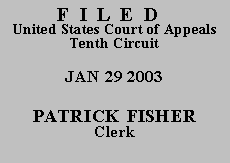

| UNITED STATES OF AMERICA,
Plaintiff - Appellee, v. ANTHONY DEWAYNE HISHAW, Defendant - Appellant. |
CR-98-128-A |
After examining the briefs and appellate record, this panel has determined unanimously that oral argument would not materially assist the determination of this appeal. See Fed. R. App. P. 34(a)(2); 10th Cir. R. 34.1(G). The case is therefore ordered submitted without oral argument.
Defendant Anthony Dewayne Hishaw seeks a certificate of appealability (COA) to appeal the federal district court's denial of his 28 U.S.C. § 2255 motion for relief from sentence. Because he has failed to make a "substantial showing of the denial of a constitutional right," as required by U.S.C. § 2253(c)(2), we deny his request for a COA and dismiss the appeal.
Hishaw was convicted of possession with intent to distribute crack cocaine, in violation of 21 U.S.C. § 841(a)(1), and was sentenced to 360 months' imprisonment. He was also convicted of knowingly possessing a handgun after a felony conviction, in violation of 18 U.S.C. § 922(g)(1), and sentenced to a concurrent 120-month sentence. On direct appeal, Hishaw contended (1) the district court erred in denying his motion to suppress evidence; (2) the evidence was insufficient to support his § 922(g)(1) conviction; (3) the government failed to prove the quantity of cocaine, as required by Apprendi v. New Jersey, 530 U.S. 466 (2000); and (4) at sentencing, the district court relied on drug transactions for which he was not convicted. His conviction under § 922(g)(1) was reversed, but his conviction and sentence for violation of § 841(a)(1) were affirmed on appeal. See United States v. Hishaw, 235 F.3d 565 (10th Cir. 2000). He did not file a petition for rehearing with this court. His petition for writ of certiorari with the Supreme Court was denied. See Hishaw v. United States, 522 U.S. 908 (2001).
Hishaw filed the present § 2255 habeas petition on June 11, 2002, asserting (1) the Tenth Circuit erred in its application of Apprendi; (2) the Tenth Circuit's refusal to suppress evidence from the warrantless search conflicted with the law; and (3) fundamental fairness required that he receive a new trial on the § 841(a)(1) charge. The district court determined that Hishaw was seeking collateral relief based on issues similar to those raised in his direct appeal, and that it is not the district court's role to serve as an appellate court to review errors which allegedly occurred in the Tenth Circuit's prior ruling. The district court denied relief, concluding it could not revisit issues previously decided absent an intervening change in the law. United States v. Warner, 23 F.3d 287, 291 (10th Cir. 1994). In his brief on appeal, Hishaw contends this court and the district court should have applied Apprendi to require resentencing. Specifically, Hishaw argues his sentence should be based upon drug amounts proven before the jury and amounts included in sentence calculations as relevant conduct should not have been considered. Hishaw also contends that fundamental fairness requires that he receive a new trial on the sole count for which he remains convicted. As regards this second issue, Hishaw asserts he would not have admitted that he committed the crime for which he stands convicted had the Apprendi decision pre-dated his trial.
We agree with the district court's determination that Hishaw's contentions regarding his sentence are reassertions of the arguments raised and addressed in his direct appeal. Further, the district court correctly concluded that we cannot expand § 2255 to require a new trial where no violation of the Constitution or laws of the United States has been shown.
The application for a COA is DENIED and the appeal is DISMISSED. The mandate shall issue forthwith.
Entered for the Court
Mary Beck Briscoe
Circuit Judge
*.This order and judgment is not binding precedent, except under the doctrines of law of the case, res judicata, and collateral estoppel. The court generally disfavors the citation of orders and judgments; nevertheless, an order and judgment may be cited under the terms and conditions of 10th Cir. R. 36.3.